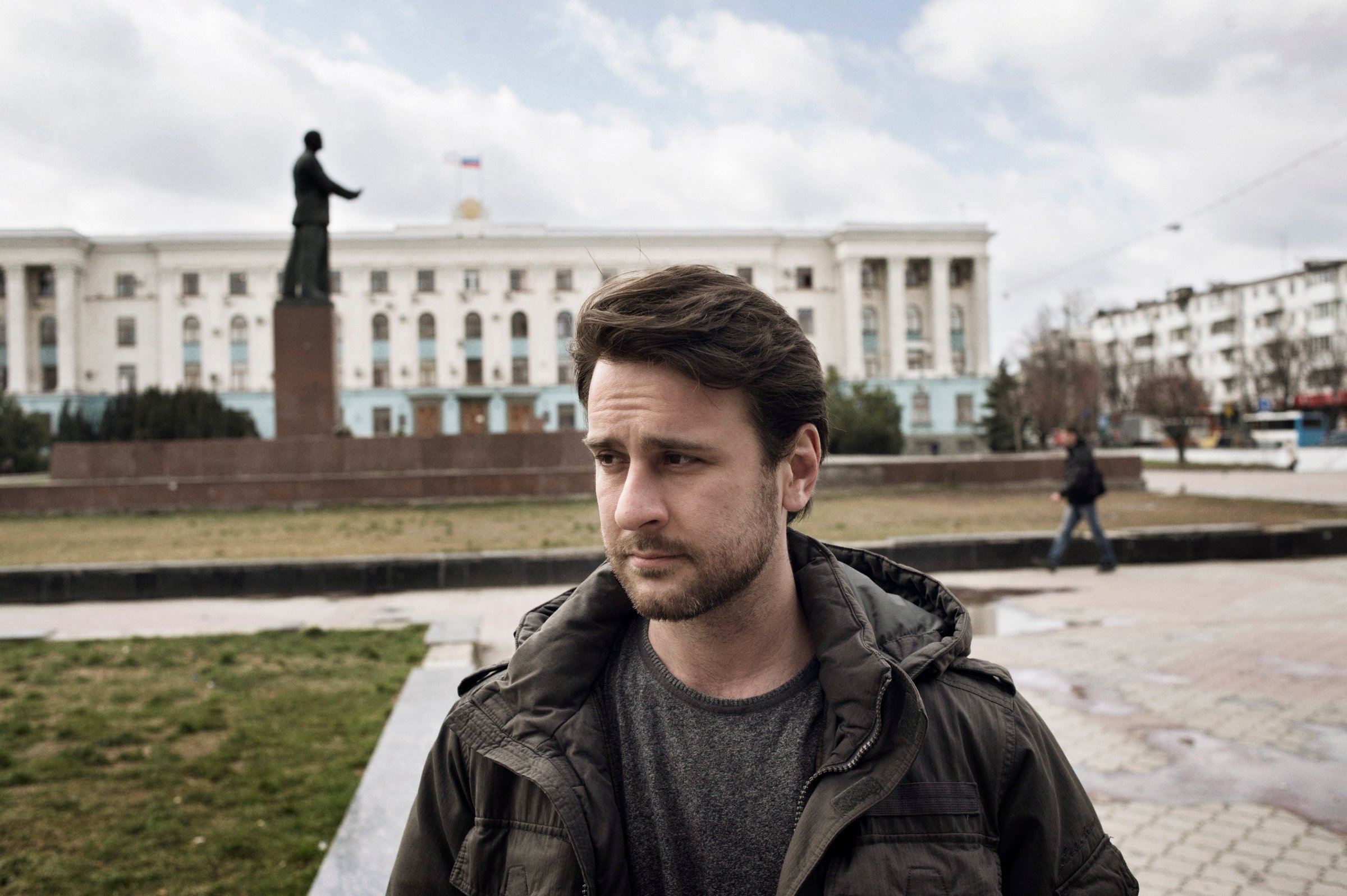
On the evening of March 15, TIME’s Berlin correspondent, Simon Shuster, walked out of his hotel room in the Crimean capital of Simferopol and came face to face with three men–one wearing a ski mask–carrying automatic rifles fitted with silencers. “They looked like hostage takers or terrorists,” says Simon, who has been covering the crisis in Ukraine for weeks. “They had no insignia.” The men patted him down and told him to sit on a couch and not to take photographs. He did anyway, posting them to Twitter as the occupation of the hotel by two dozen armed men–who may have been members of Russian special forces–continued.
Simon went straight from covering the Olympics in Sochi to traveling throughout Ukraine, capturing the growing crisis daily for TIME.com and the magazine. (His story on the aftermath of the Crimea referendum appears on page 12.) He is that rare storyteller who can get the powerful to talk as candidly as the powerless. He has introduced TIME readers to key players in the crisis like Dmitro Yarosh, the extreme nationalist leader of an influential group of Ukrainian protesters who is now running for President, and Sergei Aksyonov, the pro-Russian leader of the Crimean secessionist movement and a sworn enemy of Yarosh’s. A native Russian speaker, Simon has also spent time with people whose names will never be known but who have the most to lose. “Though I’m not exactly a native son here,” he says, “I’ve never felt like an outsider in Ukraine either. My father grew up here, in a town called Khmelnitsky, in a western part of the country that is now deeply anti-Russian. I have uncles, aunts and cousins whom I visit almost every summer in Odessa, which is pro-Russia.”
Following the deadliest day of protests in Kiev, it was not the sight of the corpses that unnerved Simon, laid out in the street outside his hotel and covered by old Soviet blankets with patterns he remembered from childhood. The shock of events caught up with him only when he visited a monastery that had allied with the revolution. “Everyone was talking about snipers on the roofs and Russian death squads coming in helicopters any minute,” he says. “But the people weren’t too scared to go outside. They came by the thousands to that monastery to deliver food, supplies, help in any way they could. That’s what got to me. Their idealism and anger and grief, as they were stacking boxes, helping the injured, directing new arrivals. The instinct of self-preservation should have kept them home, watching it all unfold on TV. But some other instinct had kicked in. I’m not sure what it was, though I suspect it was at least a cousin of the instinct that in 1989 made my parents leave everything they’d known for their entire lives and leave Moscow with no money, a few possessions, no idea where we would end up. Somewhere in the West. Whatever that meant. Everybody just knew that this place we were in was all wrong and everything had to change for life to be better.”
That night at the monastery, Simon was certainly an outsider, and not just because he was a journalist covering a major story. His Russian has a Moscow accent, which to the protesters that night sounded like the enemy. “They hated the sound of my voice, which they associated with the people who supported the people who shot 77 people dead on the square that morning,” Simon recalls. “They were almost ready to hate me too. There was no point explaining that I’m an American citizen, that my father is Ukrainian, that I’m a journalist. The accent was all it took. This was the new Ukraine. I hope it doesn’t stay this way.”
Nancy Gibbs, MANAGING EDITOR
Please recycle this magazine and remove inserts or samples before recycling
More Must-Reads from TIME
- Cybersecurity Experts Are Sounding the Alarm on DOGE
- Meet the 2025 Women of the Year
- The Harsh Truth About Disability Inclusion
- Why Do More Young Adults Have Cancer?
- Colman Domingo Leads With Radical Love
- How to Get Better at Doing Things Alone
- Michelle Zauner Stares Down the Darkness
Contact us at letters@time.com